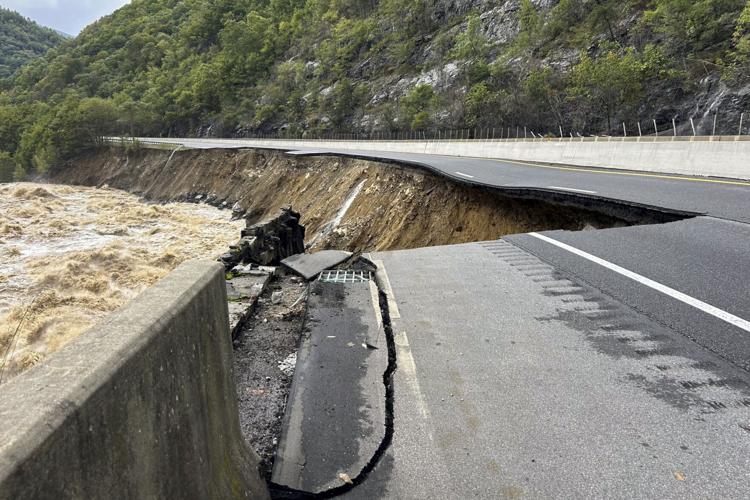We are finally slowing down to share some information here that we have been sharing in Facebook posts and synod e-news in the days since Hurricane Helene struck the Carolinas.
These are some important things to remember during this period of immediate rescue and response.
If you are having difficulties with cell phone service, RESTART YOUR PHONE. By simply turning it off and back on, you should be able to access emergency roaming, which allows any phone to access any cellular system, allowing for better service in affected areas.
Please DO NOT SEND STUFF unless the items have been specifically requested and you know that there is a location to store the supplies and someone ready to distribute them.
DONATE MONEY to a reputable organization (including the synod disaster fund, Lutheran Disaster Response). Your donations will go to those in need, purchase food, water, and supplies actually needed and requested, and will be delivered to a place that is set up and ready to receive them. As local stores begin to open, cash gifts or gift cards can be distributed by recovery agencies so that they can buy the items they need and support the local economy.
Assemble CLEANUP KITS (also known as flood buckets). These are going to be needed by the thousands. If you made some, make sure we know where they are located, and we will help get them collected and delivered to the right place for distribution. If you have not made any yet but would like to, there is still time. The list is available here.
This time will come to VOLUNTEER, but it is not time yet. Please do not self-deploy! Unless you are a trained professional, working with a rescue or repair crew, do not go into the impacted area. There is no housing, food, or water available for you, and it is difficult to purchase gas to get back home.
When there is work suitable for volunteers, LDR Carolinas will ask for volunteers or connect you with a group that needs volunteers. This will include work like debris removal, tarping, muck and gut, plus roof and home repair. This will happen when we do have the facilities available to support volunteers. That time will come, and it will last for many years. Ten years after Katrina, they were still rebuilding homes. Helene will be no different.
Your congregation can help in many ways. You might want to host volunteers (especially if you have showers) or help feed volunteers. You may create a volunteer team for when they are needed. You might host teams on their way to other locations affected by Helene in Georgia, Tennessee, or Florida. There are many ways to help, and they will all be needed in time.
As the immediate rescue and response to Hurricane Helene continues, we want to share some valuable information about moving into recovery.
First, anyone who has experienced residential damage should take photos before beginning cleanup in order to have documentation of the damage. It will provide proof of the furnishings you had that were destroyed or needed to be thrown away because they were wet or broken. These may be needed for insurance or FEMA claims.
We encourage everyone who has had damage due to Hurricane Helene to call Crisis Cleanup at 844-965-1386. (It is also still possible to call Crisis Cleanup for assistance after the No-Name Storm that caused severe flooding in Southeastern NC. That hotline is 910-218-1569. It will be closing on October 4.)
Crisis Cleanup helps homeowners receive volunteer assistance with tree and debris removal, tarping, and muck and gutting. Using this system helps volunteer organizations coordinate their work, and helps officials assess the needs in the community. A handbill and a flyer with pull-tabs are available for Hurricane Helene. You are encouraged to copy these and share them with others.
As contractors start showing up – as they do after every storm – make sure they are legitimate. If they offer a deal that sounds too good, it probably is. Pastor Rusty Kehl (Florence SC), who is a former contractor, offers a list of suggestions on negotiating with contractors.
After a home is flooded, it is important to remove the wet furnishings and building materials. There are volunteer groups that will help with this muck and gut process, and many organizations will be distributing cleanup buckets.
Many people plan to do their own cleanout, but a guide to Muck and Gut used for volunteer training by Lutheran Disaster Response gives guidance on completing the process safely. The steps are important to complete, so that mold will not become a problem in the home in the future.
Be sure to file for FEMA assistance if you are in an eligible county in western NC, upstate SC, or the Eastern Band of Cherokee. You must file before the deadline. Those deadlines are November 27 in North Carolina and November 29 in South Carolina. You can file online at www.disasterassistance.gov, download the FEMA app to your phone, or call 800-621-3362. A checklist of the information necessary to file is available here.
We encourage you to copy these resources and share them with others. Follow LDR Carolinas for more information. And as always, contact Ray or Ruth Ann with any questions!





